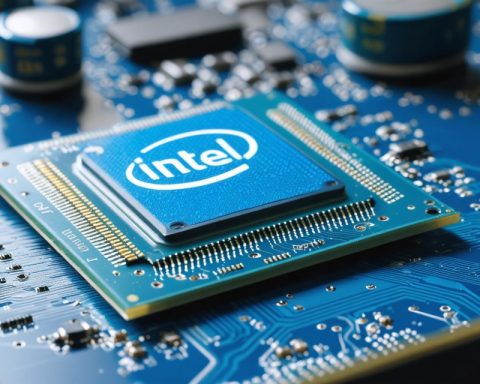- Europe, led by France, positions itself as a significant player in the global AI race with a $112.8 billion investment.
- President Macron’s announcement underscores Europe’s ambition to rival the AI dominance of the U.S. and China.
- American and Chinese investments continue to surge, with the U.S. committing $325 billion by 2025 and China showcasing innovations like cost-effective AI models.
- Despite criticism of Europe’s tech regulations, there are emerging signs of leadership within the continent’s AI sector.
- China encourages international cooperation in AI to realize shared advancements beyond national capabilities.
- The potential economic impact of AI is substantial, with predictions of boosting U.S. labor productivity by 15%, adding $4.5 trillion to GDP.
- Europe’s bold move reflects a desire to redefine its global role in technology and innovation.
Amidst a global AI race, Europe stakes a monumental claim on the future, as the grandeur of Paris hosts the Artificial Intelligence Action Summit. France’s audacious commitment—a staggering $112.8 billion investment in AI—announced by President Macron, signals more than Europe’s determination to reinvent itself as an AI powerhouse. This bold move echoes a continent’s desire to redefine its role on the global AI stage, long dominated by the United States and China.
The timing is impeccable. Across the Atlantic, American tech titans have pledged an even heftier $325 billion by 2025 to cement their dominance. Meanwhile, China flexes its innovative prowess with breakthroughs like DeepSeek’s cost-effective AI models, asserting its place as an evolutionary leader.
Critics have often frowned upon Europe’s seemingly stifling tech regulations, claiming they choke innovation. Yet, Victor Riparbelli, the visionary behind AI video company Synthesia, sees sparks of leadership emerging across the continent, suggesting a promising shift.
Beyond mere rivalry, China advocates for cooperation over competition, urging nations to unite for shared advancements in AI. Such alliances could unlock the immense potential of this technological frontier, achieving heights unattainable by any single nation.
The stakes—and the benefits—of AI are monumental. Economists predict that widespread generative AI use could uplift U.S. labor productivity by 15% over the next decade, injecting $4.5 trillion into the annual U.S. GDP. This wave can swell across sectors, starting with hardware and infrastructure, eventually sweeping through software, platforms, and ultimately transforming productivity and efficiency globally.
In this swirling dance of mega-investments and diplomatic nuances, Europe unfurls its banner, daring to dream ambitiously and challenge the very tenets of innovation. The world watches with bated breath as the AI frontier expands, dangling the promise of transformation and exponential growth.
Unveiling Europe’s Bold AI Strategy: What It Means for the Future
How-To Steps & Life Hacks
1. Invest in AI Education: European countries can bolster their AI workforce by investing in specialized AI courses and training programs. Governments and private sectors should focus on enhancing skills in machine learning, data science, and AI ethics.
2. Private-Public Partnerships: Encourage collaborations between academia, industry, and government to foster innovation. Programs like France’s $112.8 billion AI investment could serve as a model for other nations seeking to boost their AI sectors.
3. Innovate within Regulations: European companies can learn to innovate within the existing regulatory framework, balancing between ethics and advancement. Synthesia’s Victor Riparbelli promotes this mindset, seeing a potential leadership role for Europe.
Real-World Use Cases
– Healthcare: AI technology can revolutionize diagnostic processes and personalized medicine, driving efficiency and accuracy in patient care.
– Transport: Autonomous vehicles and AI traffic management systems improve transport efficiency and reduce accidents.
– Smart Cities: AI applications can optimize energy management, waste collection, and city planning, creating sustainable urban environments.
Market Forecasts & Industry Trends
The global AI market is anticipated to grow significantly, potentially reaching over $500 billion by 2025. Europe’s investment positions it to capture a substantial share of this market, especially in sectors like smart manufacturing and green technology.
Reviews & Comparisons
Europe’s approach to AI involves stricter regulations compared to the U.S. and China, focusing on ethical AI use. This can be seen as both a hindrance and a safeguard, preventing misuse and enhancing public trust.
Controversies & Limitations
Critics argue that Europe’s regulatory framework could hinder rapid AI development. However, advocates believe it ensures sustainable and ethically responsible progress.
Features, Specs & Pricing
As AI applications become more mainstream, costs are expected to decrease due to competition and technological advancement. This shift could lead to increased accessibility for smaller businesses.
Security & Sustainability
AI security is a pressing issue. Europe’s regulations are designed to address privacy and data protection, ensuring AI systems are secure and resilient against breaches and misuse.
Insights & Predictions
Experts suggest that AI will redefine industries, with Europe playing a pivotal role in ethical AI development. The continent’s focus on regulations could set a global standard for responsible AI.
Tutorials & Compatibility
Users should focus on understanding AI fundamentals and compatibility with existing systems. Adopting user-friendly AI platforms can simplify integration into current business models.
Pros & Cons Overview
Pros:
– Strong regulatory framework ensures ethical AI use.
– Significant investments bolster Europe’s presence in the global AI market.
– Potential leader in sustainable and ethical AI development.
Cons:
– Regulations may slow down innovation compared to less-regulated regions.
– Europe needs to catch up with the AI expertise concentration found in the U.S. and China.
Actionable Recommendations
– Stay Informed: Keep up with the latest AI trends and regulatory changes in Europe to understand the evolving landscape.
– Invest in Skills: Businesses should invest in AI education for their workforce to leverage new technologies.
– Balance Regulation and Innovation: Aim for innovation that aligns with ethical and regulatory standards to foster sustainable growth.
For more information on AI trends and developments in Europe, visit Europa.
By understanding Europe’s strategic position in the global AI race, businesses and individuals can capitalize on emerging opportunities while navigating the challenges of a regulated yet innovative landscape.










